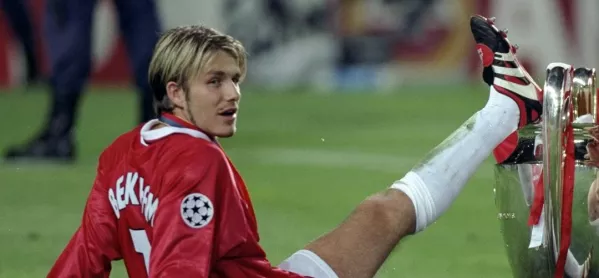- Home
- How trainee teachers can learn from David Beckham
How trainee teachers can learn from David Beckham

There are some things you learn very quickly as a teacher. One of them is that trying to get a class of excitable Year 9 students to enter your classroom quietly is not simple. Many years ago, during my first few weeks of teaching, I thought about it each night as I went to sleep and every morning as I scuttled back to my classroom. I tried numerous strategies: I projected interactive “Do Now” activities on my whiteboard to try to entice them to their desks, I threatened detentions before they had even sat down, I tried remaining silent and communicating using only non-verbals. Nothing worked.
It wasn’t until the end of my first month that I was encouraged by a colleague to go and spend some of my non-teaching time in my head of department’s class, watching the way he welcomed and settled his students. The next few days were enlightening. I jotted down exactly what I saw at the beginning of his lessons: how was he standing, where was he looking, what was he saying, how he was saying it. Back in my classroom, I imitated him as precisely as I could. And it worked! Not overnight, but slowly it started working. I continued to observe and precisely replicate what my mentor had been doing and a few months later my pupils were entering my classroom quietly and ready to learn.
This premise of imitation lies at the heart of Ark Teacher Training. We believe that all trainee teachers should begin their teaching journey by watching experts in their field. After all, teaching is a performance profession; you are constantly live in front of pupils and need to think on the spot. Trainee surgeons practise sutures on oranges hundreds of times so they don’t make a mistake on a live person. They spend hundreds of hours in theatres watching their mentor, then, through imitation and practice, they are able to refine their skills, turning them into muscle memory, ensuring they make no mistakes when working with a patient.
Bend it like Beckham
Unfortunately, such opportunities for trainee teachers to watch and imitate excellence are not commonly found in their timetable. As Paul Bambrick-Santoyo, author of Leverage Leadership, says, “We would never entrust our loved ones to an inexperienced surgical resident. We expect the head surgeon to coach and intervene when necessary. Why shouldn’t parents expect the same from us when it comes to the education of their children?”
Trainee teachers aren’t given the time to observe experienced teachers, and expert teachers are not given enough opportunities to share their expertise with those new to their field. Teaching is still a “closed-door profession”, says Simon Burgess, from the University of Bristol. It is still a common misconception that teaching is an innate skill that comes naturally to new teachers.
Anders Ericsson carried out extensive research on what it takes to become an expert. Ericsson (1993) says that it takes 10,000 hours (20 hours for 50 weeks a year for 10 years = 10,000) of deliberate practice to become an expert in almost anything. The key here is “deliberate”.
David Beckham, for example, did not stumble upon the fact that his free kicks were generally well above the standard of most other players of his era. These skills were the result of many years of precise and deliberate practice.
Beckham himself said: “I must have taken tens of thousands, maybe hundreds of thousands [of free kicks]. I would go to the local park, place the ball on the ground and aim at the wire meshing over the window of a small community hut. When my dad got home from work, he would give me feedback and I would adapt my kick: the position of my toes, the pace of the ball, the direction of my shoulders. I kept going until the sun had gone down and my kick was perfect.”
It seems fair to say that “practice makes perfect” applied to one of England’s most successful footballers, so why shouldn’t it apply to the most successful teachers? At Ark Teacher Training, we provide trainees with opportunities to do just this. Every week trainees watch and analyse videos or live models of exemplary teaching from our colleagues across the Ark network. They hone in on a different set of skills and together they codify what made the examples so successful. They then have the opportunity to give it a go themselves, by unpicking the successes, practising and receiving feedback on these skills, and repeating the practice until the skills are embedded.
Of course, we aren’t just encouraging teachers to copy others. We don’t want a workforce of identical teachers. Instead, we believe that, if a teacher is going to develop their own style and persona as a teacher, first they have to learn and master the basics by practising and refining them. Only once they reach this stage will teachers be in a position to find their own style and persona, which we call the innovation stage. This is the stage when our teachers will become the David Beckhams of teaching - who can encourage a new generation of teachers to become great, inspiring teachers and future leaders of our schools.
Claire Smith is curriculum designer for Ark Teacher Training (Institute for Teaching)
Keep reading for just £1 per month
You've reached your limit of free articles this month. Subscribe for £1 per month for three months and get:
- Unlimited access to all Tes magazine content
- Exclusive subscriber-only stories
- Award-winning email newsletters
